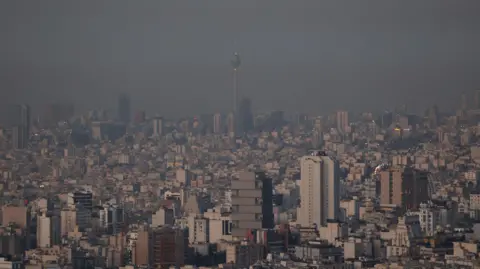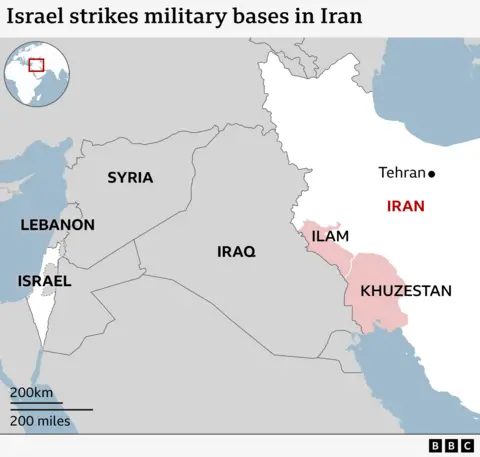
 Reuters
Reuters
Israel has carried out what it described as “precise and targeted” airstrikes on Iran in retaliation for the barrage of missile strikes launched by Tehran against Israel earlier this month.
It is the latest in a series of exchanges between the two countries that for months have sparked fears of an all-out regional war.
But while Iran says Saturday's strikes against military sites killed four soldiers, early indications suggest the attacks were more limited than had been feared.
Here’s what we know.
How did the attacks unfold?
Around 02:15 local time (22:45 GMT on Friday), Iranian media reported explosions in and around the capital, Tehran.
Video uploaded to social media and verified by the BBC showed projectiles in the sky over the city, while residents in some areas reported hearing loud booms.
Shortly after, the Israel Defense Forces (IDF) confirmed it was carrying out “precise” strikes on “military targets” in Iran.
The attacks involved scores of aircraft, including jets and drones. The targets included Iran’s air defences, as well as missile and drone production, and launch facilities.
Israeli Prime Minister Benjamin Netanyahu and Defence Minister Yoav Gallant followed the operation from the IDF’s command and control centre in Tel Aviv.
The strikes came in several waves, over a three-hour period. Just after 06:00 (03:00 GMT), the IDF said the strikes had concluded.
The White House described the strikes as an “exercise of self-defence”. A senior administration official said the US had worked with Israel to encourage a "targeted and proportional" response.
What was the scale of the attacks?
The extent of the attacks - and the damage caused - remains unclear at this stage.
The IDF said it hit around 20 targets, including missile manufacturing facilities, surface-to-air-missiles and other military sites.
The Iranian military confirmed that four soldiers had died, two “while battling projectiles”.
Iranian authorities said sites in Tehran, Khuzestan and Ilam provinces were targeted. The country’s air defence said it had “successfully intercepted” the attacks, but that “some areas sustained limited damage”.
BBC Verify has identified damage at a defence ministry base to the east of Tehran, and at an air defence base to the south.
A senior US administration official said the attacks did not damage Iranian oil infrastructure or nuclear facilities, targets President Joe Biden had urged Israel not to hit.
Syrian state media also reported strikes on military sites in central and southern Syria, though Israel has not confirmed striking the country.


Why did Israel attack Iran?
Iran is the primary backer of a range of groups across the Middle East - often described as proxy groups - that are hostile to Israel, including Hamas and Hezbollah, which Israel is currently at war with.
In April, Iran launched its first direct attack on Israel, with about 300 missiles and drones, in retaliation for an Israeli air strike on an Iranian embassy compound in Syria that killed several top commanders from Iran’s Revolutionary Guard Corps (IRGC).
Israel responded with a “limited” strike on a missile defence system in the Iranian region of Isfahan, which Iran chose not to respond to.
Later, in July, Israel killed a top Hezbollah commander in an airstrike on Beirut. The next day, Hamas political leader Ismail Haniyeh was killed in an explosion in Tehran. Iran blamed Israel, though Israel did not comment.
In late September, Israel assassinated Hezbollah leader Hassan Nasrallah and Brig-Gen Abbas Nilforoushan, a high-ranking Iranian official, in Beirut.
On October 1, Iran launched about 180 ballistic missiles at Israel, which it said was in response to the deaths of Haniyeh, Nasrallah and Nilforoushan.
This latest attack on Iran is Israel's response to that.
What happens next?
Israeli Prime Minister Benjamin Netanyahu's office denied a report by US outlet Axios that prior to the attacks, Israel sent Iran a message revealing certain details about the strikes, and warning Tehran not to respond.
"Israel did not inform Iran before the attack - not about the time, not about the targets, not about the strength of the attack," the prime minister's spokesperson said.
Still, early signs indicate this attack was not as serious as some had feared.
The IDF said in a statement that "we are focused on our war objectives in the Gaza Strip and Lebanon. It is Iran that continues to push for a wider regional escalation".
A senior US official said "this should be the end of this direct exchange of fire between Israel and Iran".
Iran’s foreign ministry said it was "entitled and obligated to defend itself" and described the attack as a violation of international law.
But it also said that Tehran recognises its "responsibilities towards regional peace and security".
What is the situation in Iran?
Images published by Iranian state media show life continuing in relative normality - with busy streets, people exercising in parks, and fruit and vegetable markets open as usual.
Iran closed its airspace for a few hours overnight, but it later reopened and commercial flights were in the air across the country by late afternoon.
But there are signs the Iranian government are keen to play down the impact of the attacks.
The IRGC has announced that it is a criminal offense to send “images or news” related to the attack to outlets that it deems "Israel-affiliated" or "hostile”. Usually, Iran refers to Western media as hostile.
Iranian media reported today that Tehran's Prosecutor Office has filed charges against an unnamed website for “covering issues counter to national security".
How has the world responded?
US National Security Council spokesman Sean Savett said Israel’s response “avoided populated areas and focused solely on military targets, contrary to Iran's attack against Israel that targeted Israel's most populous city".
But Washington’s aim, he added, is “to accelerate diplomacy and de-escalate tensions in the Middle East region".
UK Prime Minister Sir Keir Starmer said Israel had the right to defend itself, but urged all sides to “show restraint” and called for Iran not to respond.
Saudi Arabia condemned the attack, and warned against any action that "threatens the security and the stability” of the region.
Egypt's foreign ministry echoed those concerns, saying it was “gravely concerned” by the strikes.
Hamas described them as "a flagrant violation of Iranian sovereignty, and an escalation that targets the security of the region and the safety of its peoples".
Additional reporting by Ghoncheh Habibiazad, BBC Monitoring

 3 weeks ago
7
3 weeks ago
7










 English (US) ·
English (US) ·